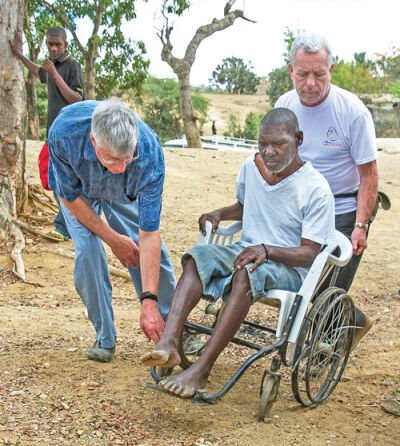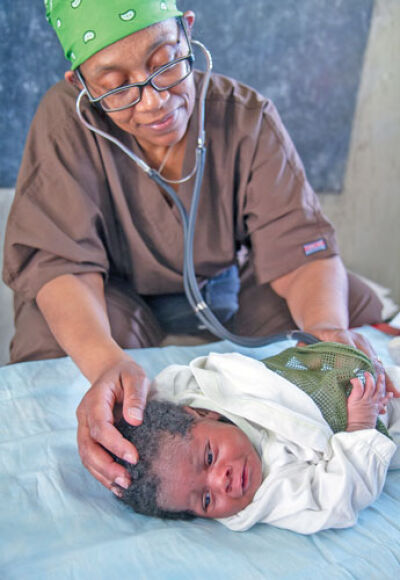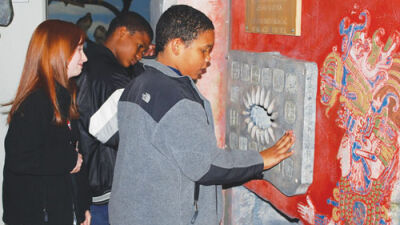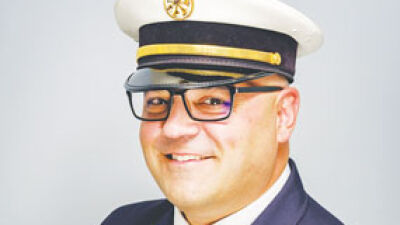
Tom Maza and John Messina, volunteers with Haiti Outreach Mission, assist a patient at a clinic during a visit in 2012.
Photo by Valerie McNeece

Dr. Dominque Monde-Matthews, founder of Haiti Outreach Mission, treats a young patient during a trip to the country in 2012. Many families have been displaced following recent events there.
Photo by Valerie McNeece
METRO DETROIT — A mission group to Haiti that includes churches in Sterling Heights, Southfield and more is sounding the alarm on the plight of the country — the poorest in the Western Hemisphere — as gangs have captured the town of Mirebalais, once a safe haven.
A letter by Kesner Gracia, an Episcopalian priest in Haiti, described the scene in April.
“Haiti has become a veritable human slaughterhouse,” he wrote. “In Mirebalais, the streets are littered with corpses. … Unspeakable scenes of terror unfold before our very eyes.”
Haiti Outreach Mission, a Troy-based nonprofit, has been wiring funds to partners in Haiti since it’s no longer safe to travel there. Projects include medical and dental clinics, a lab and pharmacy, water purifiers, and funding for food, shelter and supplies.
People can help by donating to HOM, which also urges churches to help.
Five local churches are already involved: St. Blase Catholic Church in Sterling Heights; St. David’s Episcopal Church in Southfield; Our Lady of Victory Catholic Church in Northville; St. Clare of Assisi Episcopal Church in Ann Arbor; and Corpus Christi Catholic Church in Detroit. A sixth is outside of Michigan: St. Bernard Catholic Church in Billings, Montana.
Dr. Dominique Monde-Matthews, HOM’s founder, said the people of Mirebalais have left their homes.
“The priests know where the camps are and they’re bringing them supplies. They’re also trying to continue schooling so the little ones have some normalcy,” she said. “By helping them stay alive, we hope they can return home someday.”
Another world
John Messina, a parishioner at St. Blase in Sterling Heights, has gone to Haiti with various groups 28 times.
“I remember the first trip in 2000,” he said. “It was like walking into a heatwave — just overwhelming.”
The town of Mirebalais is perched on a plateau in the mountains near the capital of Port-au-Prince, home to an estimated 200,000. Driving there is perilous, with blind switchbacks along sheer cliffs.
Aid workers say that once in town, outsiders are hit with the stench of sweat and garbage mixed with burning charcoal — the primary means of cooking in a place with no power.
Tightly packed houses line the winding streets. The homes are made of cement block with metal roofs. Light flows through small windows with no screens. There are no furnaces or air conditioning.
There is no municipal water supply, either. Potable water is sold in 5-gallon jugs or smaller. A Haiti Outreach Mission store helps filter and disinfect the water.
Even before the gangs grew in strength, electricity was unreliable, created by hydropower strained by low levels in the river. HOM has tried to offset this with solar panels at the clinics and priest residences.
Yet despite the challenges, the Haitians endured.
‘They were still giving’
Aid workers describe the people of Mirebalais as warm and welcoming. Their faith keeps them strong, with many walking miles to church in their bare feet so their shoes won’t be dirty when they arrive.
Messina recalled driving with a priest to a church in the mountains — actually a blue tarp strung over some trees above an altar — and having to park on the road with rocks behind each wheel so it wouldn’t slide back downhill. He noticed a group of young adults following them.
“We found out they just wanted to make sure we got there safely,” Messina said. “After Mass, they clung to us and didn’t want us to leave. One gentleman went out and he brought a bushel of coconuts. He was apologetic about the condition of the roads and opened a coconut for each of us. He said, ‘This is a refreshment for you on your way back down the mountain.’ They don’t have enough food for themselves, but they were still giving to us.”
In Mirebalais, laundry is done in the river with lye soap, laid across bushes to dry, and then smoothed with a metal iron filled with charcoal. Much of their time is dedicated to hygiene.
“We usually have rice, but one day they included drumsticks. And I saw a cleaning lady take one that we’d already eaten, and she started chewing on the gristle,” he said. “That was the first time I realized hunger.”
‘Difficult to walk away’
Monde-Matthews is a Haitian native who still has family there. She and her husband, Roger Matthews, founded HOM in 1998 after their honeymoon in her homeland. Backed by six U.S. churches, the group also works with two in Mirebalais: St. Pierre Episcopal Church and St. Louis Catholic Church.
HOM helped St. Pierre convert a building into a clinic staffed by a doctor, dentist, nurse and others. A lab was added later. When the clinic’s generator needed repairs, HOM replaced it. HOM also sent a compressor for the dental clinic and paid for provisions to feed kids. When mission trips were still possible, the group would also bring fluoride and medicine.
HOM also supports schools such as Monsignor Remi Augustin School — originally an orphanage built with money from St. Blase. The water purifiers nearby were funded by HOM and maintained by St. Louis.
Recently, HOM paid for solar panels at the St. Pierre clinic and St. Louis rectory. The panels are more reliable than the power company and cheaper than diesel.
But there’s much to be done, Messina said.
“The people line up outside the clinic the day before we arrive and wait all through the night. And the sad thing is when we leave, the line is just as long,” Messina said. “It’s difficult to walk away. I don’t know anyone who’s gone who wouldn’t be willing to go back.”
‘The biggest thing we give them is hope’
Now, much of the city is abandoned. HOM estimates there are about 10,000 people displaced nearby.
“When the gangs started taking over Port-au-Prince, the refugees wound up in Mirebalais, and we helped them. Now, the tables have turned, and the people of Mirebalais are refugees. And one wonders if the gangs will march farther and get them again,” said Monde-Matthews. “It’s so sad.”
In his letter, Gracia, the Episcopalian priest in Mirebalais, said that “misery, for its part, is intensifying.”
“Bellies are empty. Children are crying from hunger. Parents, who left without taking anything with them, are powerless to hear their children’s cries,” he wrote.
He urged Americans to give what time and money they can.
“Every gesture counts,” Gracia said. “Solidarity can save a life.”
Messina agreed.
“The biggest thing we give them is hope,” he said.
Donations to HOM are tax deductible. To donate, click the “Donate” button at haitioutreachmission.org, or write a check to “Haiti Outreach Mission,” 5700 Crooks Road, Suite 100, Troy, MI 48098. To learn more, call (248) 385-7411 or visit haitioutreachmission.org.
 Publication select ▼
Publication select ▼




























